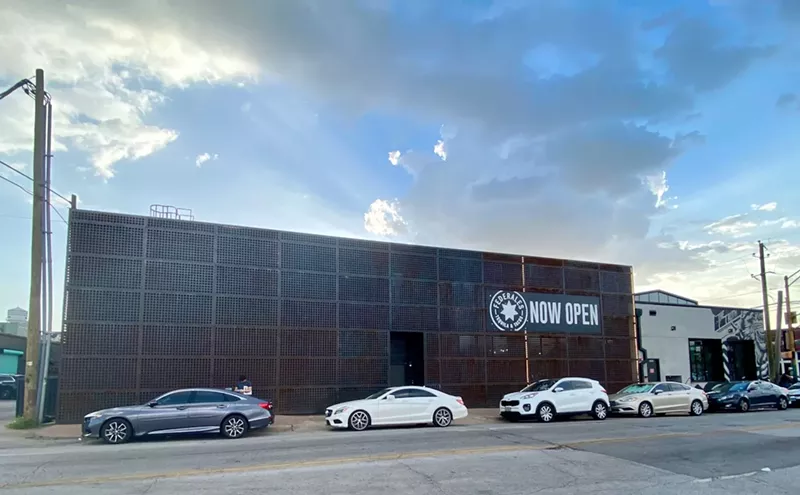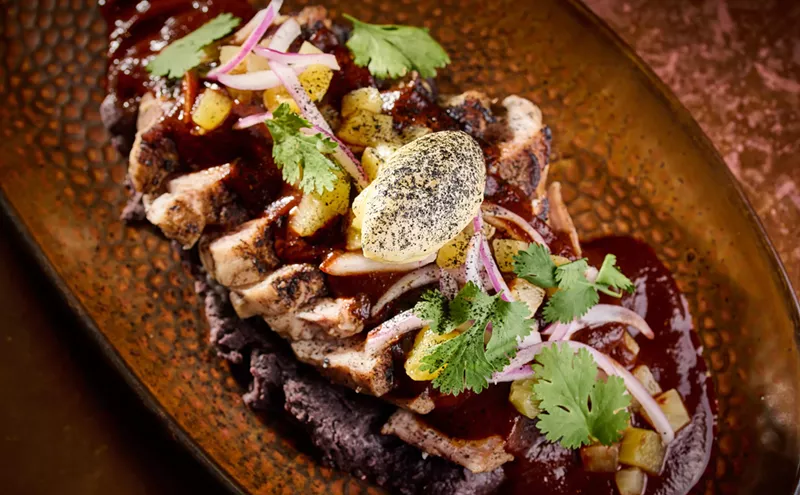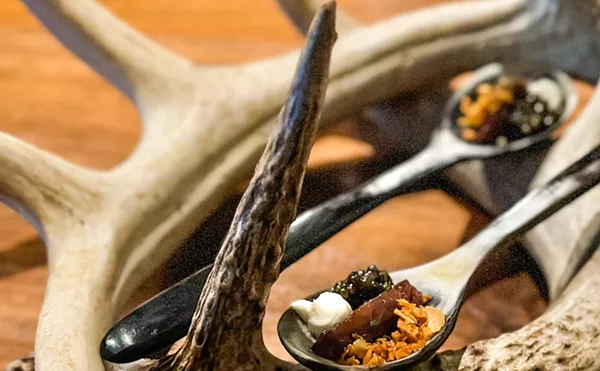You wouldn't know the behind-the-scenes madness to look at the restaurant today. It's untouched by all its troubles, completely revamped, restored to its original condition with a full complement of employees in place. Temporary, floor-to-ceiling windows replace the tornado-shattered originals; the unmatched view of North Texas from the 35th floor of the Bank One Tower hasn't suffered a bit. The restaurant's hallmark leather menus, cowhide-covered chairs, comfy leather sofas, cowboy memorabilia, and western art are back in place; if anything, the swirling rumors of Reata's ultimate defeat may be packing in the customers--some 4,000 for lunch, on average. "We keep saying it may be the last time we can eat here," one dinner patron says, ears popping as the elevator carries him past the vacant floors of the office tower to Reata's roost. "That would be a darn shame."
The cowboy-chic restaurant that some say perfectly reflects Fort Worth's love affair with its Cowtown roots reopened on May 8, in an unprecedented 42 days, at a cost of $1.5 million that Micaleff confirms came from his own pocket. "We expect to fully recover our costs from the insurance settlement, but it hasn't happened yet," he says. The entrepreneur's efforts began to unravel as a string of disaster-related consequences threatened to forever knock Reata off its tony perch atop one of Fort Worth's downtown landmarks. Only months after the storm knocked out 3,200 of the building's 3,554 plate-glass windows, Loutex Fort Worth L.P., the limited partnership that owns the tower, announced it would take its insurance money and run, putting the building up for sale or, worse yet, tearing it down and trying to sell the land out from under its still-traumatized tenants. Micaleff says he got this news in a voice mail: "'Vacate within 30 days,'" he says, shaking his head. "What a way to do business."
But it was a good business decision, to hear Loutex tell it. According to published reports, the company's experts estimated that repair costs to the building would exceed by millions the $35 million property value. One source said the glass alone would cost more than $10 million. Even Micaleff admits it didn't make economic sense; he just resented like hell the way Loutex handled it. Micaleff got the news August 1 and promptly filed a lawsuit seeking a temporary injunction to allow Reata to remain in its renewed digs. The landlords offered a 90-day reprieve, which only a few tenants took, the suit remains unsettled. Micaleff says, he hopes that Dallas-based Trammell Crow Co. will follow through on its contract and buy the property. Ron Cherry, Loutex's managing partner, confirmed Monday that the sale is going forward. "Trammell Crow is continuing their process. The building is still under contract, and we still anticipate the close this month," he said.
Even with Trammell Crow's pending bailout, it may not be the Bank One Tower for long. Micaleff received word October 2 of Bank One's intention to move to a Bass Brothers project, The Sanguinet Building, under construction one scant block north of the plywood-shrouded, vacant shell that is Reata's hard-won home. Cherry wouldn't confirm the news, saying he'd heard it "as a rumor." Representatives of the Bank and Trammel Crow didn't return calls for comment.
"People want us to rename it Reata Tower," Micaleff says, "and want us to commission a western bronze sculpture to go where the Calder used to be." Loutex received its first black eye and its "damn Canadians" label when it sold off an original, site-specific Alexander Calder sculpture shortly after taking control of the property in 1998.
When Micaleff looks back, restoring Reata to its former glory, an homage to cowboy culture and Southwestern cuisine, was the easy part.
"It's a miracle no one died that night," he says, revealing black boot-tops as he hikes up simple khaki pants in order to throw a leg over the black-and-white cowhide chair in his Roy-Rogers-meets-Buffalo-Bill office in southwest Fort Worth. The redbrick headquarters to JMK International sports a wide veranda on the sunny side, and smacks of a wealthy cattle baron's home on some West Texas prairie. Original Western art--bronzes and paintings--were crafted by the same artists Micaleff chose for the restaurant. Micaleff's companies--silicone manufacturing, ranching interests near Alpine, and smaller offshoots--kept the restaurant's staff on the payroll, parceling them out to work in subsidiaries or volunteer at the American Red Cross while Reata underwent construction.
"Our employees are real heroes," Micaleff continues. "Fifty of them moved 150 customers to safety in less than 40 seconds. And it was Mike's leadership that saved them." Micaleff's partner, Michael Evans, looks at the floor before he interrupts. Evans is the co-managing director of JMK Holdings Management Co. and a hands-on manager, with executive chef Todd Phillips, at Reata. He was there that night, and recalls watching everyday objects swirl by in the black cloud outside Reata's wall of windows. The storm's roar sounded like a jet plane, he says, and he only had to get physical with one customer. "One guy just stood there, mesmerized, like a deer in the headlights," Evans says. "I was shouting but he couldn't hear me. I had to jerk him by the shirt collar to get him into the stairwell." Evans and the restaurant staff herded stunned restaurant patrons into the relative safety of the concrete-reinforced, interior stairwell and waited as the 100-mile-an-hour winds of the tornado's vortex shot through the space. "To this day, I can't believe it," Evans says, looking up and leaning forward. "I was there, I saw the glass shards stuck in the walls, and I helped clean it up. It was a life-changing experience."
Reata rolls out a new fall menu next Monday, adding venison chili, West Texas BBQ game ribs, deep-fried turkey wraps, and a chef's chop feature. Micaleff says it's business as usual, "only better," but the tension over the tornado's domino effect shows . The last gust of wind came about a month ago, when Micaleff's friend and the restaurant's high-profile executive chef, Grady Spears, moved on to greener pastures. Spears, who couldn't be reached for comment, is on the road, touting his cowboy cuisine talents and promoting his new, Reata-inspired cookbook, Cowboy in the Kitchen. Some hometown critics say he's pimping to the Food Network and other ventures, which may include a new restaurant partnership with Nolan Ryan. "In the last several years, Grady has spent virtually no time in our kitchen," Micaleff says without the anger or sentimentality you might expect. "With all the damage and the aftermath of what was happening here, Grady just wanted out," he says. "We said fine. That's not an issue with us at all. We're still friends. There's no bad feelings about it at all."












